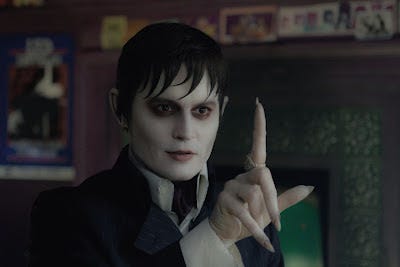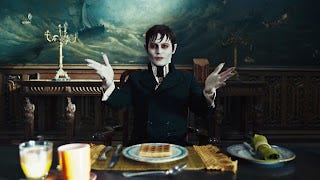Review: "Dark Shadows" is Tim Burton and Johnny Depp's entertaining return to form

Film Rating: B+
You’re either going to love Tim Burton’s “Dark Shadows” or you’re going to hate it; I can’t imagine much of a middle ground on this one. Burton aims for a very specific, pulp-flavored tone and narrative style, and it would be hard to deny that the end result is exactly what he set out to make: a confident and energetic soap opera completely unapologetic of its own trashy style, made with a massive budget, filled with movie stars, and devilishly self-aware at all times. It’s not a deep movie, nor a particularly ‘good’ one by most critical standards, but if you’re tuned into the same pulpy wavelength Burton’s operating on, the film is a tremendous amount of fun. If not, you’ll be alienated from the get-go, and “Dark Shadows” will no doubt be a thoroughly miserable experience. I can only speak for myself, of course, but I absolutely adore where Burton took this film, and though it’s certainly not a significant work by any stretch of the imagination, I found it wildly entertaining on just about every level. Continue reading after the jump...

Johnny Depp stars as Barnabas Collins
Based on the gothic soap opera from the 1960s, “Dark Shadows” takes place in the fictional Maine fishing village of Collinsport. In the eighteenth century, Barnabas Collins (Johnny Depp), heir to the town’s wealthy founding family, breaks the heart of Angelique Bouchard (Eva Green), maidservant at Collinwood Manor and, unluckily for Barnabas, a witch. She curses him, sending his parents and fiancé to their deaths before turning Barnabas himself into a vampire. Locked away in a coffin by an angry mob, Barnabas awakens nearly 200 years later, in 1972, to a world vastly different than his own. Returning to a dilapidated, dysfunctional Collinwood Manor, Barnabas discovers that Collinsport’s economy is now fueled by Angelique’s own successful fishing business. Barnabas vows to rebuild his family’s good name, while Angelique continues to plot her revenge.
I am largely unfamiliar with the original TV series, but I can at least say this: Burton’s “Dark Shadows” is a soap opera through and through. The characters are all grand and exaggerated; there are rivalries, back-stories, and betrayals aplenty; the plot is a series of increasingly ridiculous twists born from the minutiae of family status and romantic turmoil; and most importantly, there’s a heightened, theatrical sense of importance to every action or line of dialogue. It’s a wonderful tonal choice, strictly adhering to Burton’s innermost pulp sensibilities, and as I said before, if you’re into material this unabashedly trashy and knowingly silly, you’ll be amused from beginning to end. Though not in the way you may think. “Dark Shadows” has been marketed as an overt comedy, but that’s not reflective of the finished product; for the most part, Burton plays things straight with a constant sense of self awareness, and rather than craft strings of obvious jokes, we are instead invited to laugh at the silliness of, say, a vampire talking family business with his cousin. There are blatantly comedic moments, of course – usually making good use of seventies pop music for ironic contrast – but they stem from Burton’s insight into the nature of pulp horror, and in this case, that’s more satisfying than straight comedy or drama.

Tim Burton directing Johnny Depp and Eva Green
Danny Elfman’s fantastic musical score, one of his best works to date, is the main contributor to the film’s tonal success. It’s a serious, sweeping gothic soundtrack that would be right at home in a true horror masterpiece; so much of the fun of “Dark Shadows,” then, comes in hearing this wonderful, dread-soaked music plastered over a thoroughly silly soap opera. Rick Heinrichs’ production design is equally impressive; the sets, costumes, and make-up are all imaginative works of art, and even considering Tim Burton’s legendary track record in this area, this is one of his most creatively designed movies. It may also be his most visually lush, thanks to stellar cinematography by the great Bruno Delbonnel, who creates shadowy, deep frames bursting with gorgeously muted colors. On a technical level, “Dark Shadows” is absolutely masterful, and again, much of the fun comes in watching an unapologetic soap opera get so lavishly dressed up.

Johnny Depp and Michelle Pfeiffer
The cast is in on the joke as well. Johnny Depp is clearly having oodles of fun as Barnabas, committing to the role with a strict, high English authenticity; he’s assisted by some truly impressive writing, which gives him plenty of fantastically stilted dialogue to deliver. Overall, this is one of the better roles Depp has had in this recent string of Burton collaborations, though as usual, there are times he threatens to overwhelm the film. After the prologue sequence, Bella Heathcote is introduced as Victoria, a young woman moving to Collinwood to take a governess job, and she’s clearly positioned as the protagonist. It seems like a good move, too, because Heathcote is a fresh and compelling presence, one I hope to see more of in the future. But once Barnabas is resurrected, “Shadows” becomes entirely Depp-centric, and Heathcote doesn’t even get a line for another hour. This structural issue is especially troublesome when one considers that Victoria and Barnabas’ relationship is one of the few parts of the film we’re meant to take seriously. “Dark Shadows” is full of narrative flaws, but I feel many of them are intentional; this one, as far as I can tell, is not, and it’s the only substantial issue I took with the film.

Eva Green as Angelique Bouchard
In any case, the cast doesn’t end there. Michelle Pfeiffer plays Elizabeth Collins, current matriarch of Collinwood, and while she isn’t given a whole lot to do, I enjoy Pfeiffer’s presence so much that I wish she appeared in as many Burton films as Depp and Helena Boham Carter. The latter obviously makes her requisite appearance here, as the drunken psychiatrist Dr. Hoffman, and while she feels a bit shoehorned in, Carter has enough fun with the part to make the character worthwhile. As the villainous Angelique, Eva Green continues to prove my theory that every movie would be improved by her presence. Burton allows her to go as far as she can, and when opposite Depp, the amount of trashy camp chemistry is simply off the charts; I would gladly watch a movie where these two characters do nothing but stand in a room and bicker.
As it stands, “Dark Shadows” isn’t much more substantive than that. Though it gives a cursory glance to Burton’s pet theme of outsiders and dysfunctional families, the film is entirely devoid of subtext, or, indeed, messages of any sort. This is definitely Burton working in a minor key, but he’s at least directing with confidence and precision again, something lacking in recent creative misfires like “Alice in Wonderland.” He has a real, thoughtful vision this time around, and he executes it almost flawlessly, even if there’s no greater purpose here than entertainment. I’m okay with that, especially when the entire experience is this much fun.

